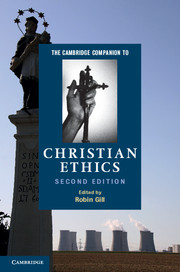Book contents
- Frontmatter
- Part I The grounds of Christian ethics
- 1 Making moral decisions
- 2 Moral traditions in eastern and western Christianity
- 3 The Old Testament and Christian ethics
- 4 The gospels and Christian ethics
- 5 The epistles and Christian ethics
- Part II Approaches to Christian ethics
- Part III Issues in Christian ethics
- Index
2 - Moral traditions in eastern and western Christianity
from Part I - The grounds of Christian ethics
Published online by Cambridge University Press: 28 January 2012
- Frontmatter
- Part I The grounds of Christian ethics
- 1 Making moral decisions
- 2 Moral traditions in eastern and western Christianity
- 3 The Old Testament and Christian ethics
- 4 The gospels and Christian ethics
- 5 The epistles and Christian ethics
- Part II Approaches to Christian ethics
- Part III Issues in Christian ethics
- Index
Summary
Christianity has been concerned from the beginning with the questions of ethics: how to live well, how to be a good person, and how to live in right relationships with other people and with God. Particular circumstances in different Christian communities have led to different ways of dealing with such questions, and these varied responses to theological, political or pastoral issues have given rise to enduring moral traditions. The history of these traditions largely follows the major lines of division between and within Eastern Orthodoxy, Catholicism and Protestantism, though in recent times interest in particular traditions has spread across theological and ecclesial boundaries. Growing Protestant understanding of natural law ethics and a wider awareness of Orthodox spirituality among western Christians are examples of these ecumenical developments. Historic Christian moral traditions have also been influenced by the various forms of modern, pluralistic culture in which most Christians now live. This article will deal primarily with the older moral traditions and the cultural and ecclesial contexts where they first developed. That will take us from early Christianity to the beginning of the twentieth century, but it is important to realise that the interactions between tradition and context are becoming increasingly complex as Christianity finds its place in a network of globalised cultural, political and economic systems.
CHRISTIANITY AND THE MORAL LIFE
Christianity emerged in a context that already had well-developed traditions of moral thought. The Hebrew prophets had proclaimed a divine standard of righteousness that the people and their rulers did not meet. Jewish wisdom literature contrasted the foolish ways of the young, the headstrong, and the wicked with the way of wisdom, in which the righteous follow God’s own pattern laid down at the creation of the world.
- Type
- Chapter
- Information
- The Cambridge Companion to Christian Ethics , pp. 16 - 27Publisher: Cambridge University PressPrint publication year: 2011



